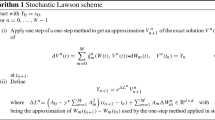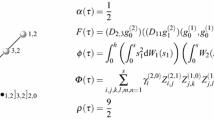Abstract
In this paper strong stability preserving (SSP) properties of Runge–Kutta methods obtained by composing k different schemes with different step sizes are studied. The SSP coefficient of the composition method is obtained and an upper bound on this coefficient is given. Some examples are shown. In particular, it is proven that the optimal \(n^2\)-stage third order explicit Runge–Kutta methods obtained by Ketcheson (SIAM J Sci Comput 30(4):2113–2136, 2008) are composition of first order SSP schemes.
Similar content being viewed by others
References
Calvo, M.P., Sanz-Serna, J.M.: Numerical Hamiltonian Problems. Chapman & Hall, London (1994)
Cavaglieri, D., Bewley, T.: Low-storage implicit/explicit Runge–Kutta schemes for the simulation of stiff high-dimensional ODE systems. J. Comput. Phys. 286, 172–193 (2015)
Ferracina, L., Spijker, M.N.: Stepsize restrictions for the total-variation-diminishing property in general Runge–Kutta methods. SIAM J. Numer. Anal. 42(3), 1073–1093 (2004)
Ferracina, L., Spijker, M.N.: An extension and analysis of the Shu–Osher representation of Runge–Kutta methods. Math. Comput. 74, 201–219 (2005)
Ferracina, L., Spijker, M.N.: Strong stability of singly-diagonally-implicit Runge–Kutta methods. Appl. Numer. Math. 58(11), 1675–1686 (2008)
Gottlieb, S., Ketcheson, D.I., Shu, C.W.: High order strong stability preserving time discretizations. J. Sci. Comput. 38(3), 251–289 (2009)
Gottlieb, S., Ketcheson, D.I., Shu, C.W.: Strong Stability Preserving Runge–Kutta and Multistep Time Discretizations. World Scientific, Singapore (2011)
Gottlieb, S., Shu, C.W.: Total variation diminishing Runge–Kutta schemes. Math. Comput. 67(221), 73–85 (1998)
Gottlieb, S., Shu, C.W., Tadmor, E.: Strong stability preserving high-order time discretization methods. SIAM Rev. 43(1), 89–112 (2001)
Hairer, E., Lubich, C., Wanner, G.: Geometric Numerical Integration. Structure-Preserving Algorithms for Ordinary Differential Equations, 2nd edn. Springer, Berlin (2006)
Hairer, E., Nørsett, S.P., Wanner, G.: Solving Ordinary Differential Equations I. Nonstiff Problems, 2 Revised edn. Springer, Berlin (1993)
Higueras, I.: On strong stability preserving time discretization methods. J. Sci. Comput. 21(2), 193–223 (2004)
Higueras, I.: Representations of Runge–Kutta methods and strong stability preserving methods. SIAM J. Numer. Anal. 43(3), 924–948 (2005)
Higueras, I.: Strong stability for additive Runge–Kutta methods. SIAM J. Numer. Anal. 44(4), 1735–1758 (2006)
Hundsdorfer, W., Spijker, M.N.: Boundedness and strong stability of Runge–Kutta methods. Math. Comput. 80, 863–886 (2011)
Iserles, A.: Composite exponential approximations. Math. Comput. 38(157), 99–112 (1982)
Iserles, A.: Composite methods for numerical solution of stiff systems of ODE’s. SIAM J. Numer. Anal. 21(2), 340–351 (1984)
Ketcheson, D.I.: Highly efficient strong stability preserving Runge–Kutta methods with low-storage implementations. SIAM J. Sci. Comput. 30(4), 2113–2136 (2008)
Ketcheson, D.I.: Runge–Kutta methods with minimum storage implementations. J. Comput. Phys. 229(5), 1763–1773 (2010)
Ketcheson, D.I., Macdonald, C.B., Gottlieb, S.: Optimal implicit strong stability preserving Runge–Kutta methods. Appl. Numer. Math. 59(2), 373–392 (2009)
Ketcheson, D.I., Parsani, M., Ahmadia, A.J.: RK-Opt: software for the design of Runge–Kutta methods, version 0.2 (2013). http://numerics.kaust.edu.sa/RK-opt
Kraaijevanger, J.F.B.M.: Absolute monotonicity of polynomials occurring in the numerical solution of initial value problems. Numer. Math. 48(3), 303–322 (1986)
Kraaijevanger, J.F.B.M.: Contractivity of Runge–Kutta methods. BIT 31(3), 482–528 (1991)
Pandal, A., Pastor, J.M., García-Oliver, J.M., Baldwin, E., Schmidt, D.P.: A consistent, scalable model for Eulerian spray modeling. Int. J. Multiph. Flow 83, 162–171 (2016)
Ruuth, S.J.: Global optimization of explicit strong-stability-preserving Runge–Kutta methods. Math. Comput. 75(253), 183–208 (2006)
Ruuth, S.J., Spiteri, R.J.: High-order strong-stability-preserving Runge–Kutta methods with downwind-biased spatial discretizations. SIAM J. Numer. Anal. 42, 974 (2004)
Shu, C.W.: Total-variation-diminishing time discretizations. SIAM J. Sci. Comput. 9(6), 1073–1084 (1988)
Shu, C.W., Osher, S.: Efficient implementation of essentially nonoscillatory shock-capturing schemes. J. Comput. Phys. 77(2), 439–471 (1988)
Spijker, M.N.: Contractivity in the numerical solution of initial value problems. Numer. Math. 42(3), 271–290 (1983)
Spijker, M.N.: Stepsize restrictions for stability of one-step methods in the numerical solution of initial value problems. Math. Comput. 45(172), 377–392 (1985)
Spijker, M.N.: Stepsize conditions for general monotonicity in numerical initial value problems. SIAM J. Numer. Anal. 45(3), 1226–1245 (2008)
Spiteri, R.J., Ruuth, S.J.: A new class of optimal high-order strong stability preserving time discretization methods. SIAM J. Numer. Anal. 40(2), 469–491 (2002)
Spiteri, R.J., Ruuth, S.J.: Non-linear evolution using optimal fourth-order strong-stability-preserving Runge–Kutta methods. Math. Comput. Simul. 62(1–2), 125–135 (2003)
van de Griend, J.A., Kraaijevanger, J.F.B.M.: Absolute monotonicity of rational functions occurring in the numerical solution of initial value problems. Numer. Math. 49, 413–424 (1986)
Author information
Authors and Affiliations
Corresponding author
Additional information
Publisher's Note
Springer Nature remains neutral with regard to jurisdictional claims in published maps and institutional affiliations.
Supported by Ministerio de Economía y Competividad (Spain), Project MTM2016-77735-C3-2-P.
Rights and permissions
About this article
Cite this article
Higueras, I., Roldán, T. Strong Stability Preserving Properties of Composition Runge–Kutta Schemes. J Sci Comput 80, 784–807 (2019). https://doi.org/10.1007/s10915-019-00956-9
Received:
Accepted:
Published:
Issue Date:
DOI: https://doi.org/10.1007/s10915-019-00956-9
Keywords
- Initial value problem
- Runge–Kutta
- Composition method
- Strong stability preserving
- SSP
- Monotonicity
- Radius of absolute monotonicity




